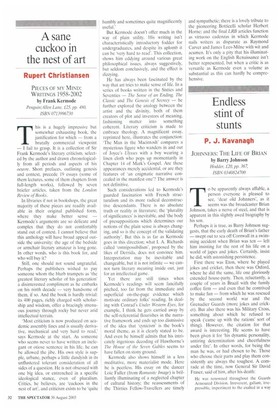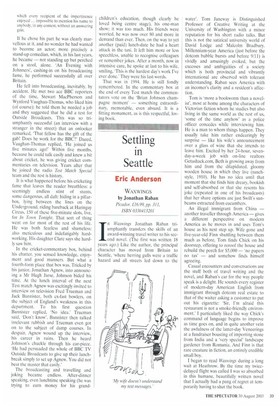Endless stint of stunts
P. J. Kavanagh
JOHNNERS: THE LIFE OF BRIAN by Barry Johnson Hodder, £20, pp. 367, ISBN 0340824700 To be apparently always affable, a person everyone is pleased to see, 'dear old Johnners', as it seems was the broadcaster Brian Johnson, takes a nerve of steel, and that is apparent in this slightly awed biography by his son.
Perhaps it is true, as Barry Johnson suggests, that the early death of Brian's father — swept out to sea off Cornwall in a swimming accident when Brian was ten — left him insisting for the rest of his life on a world of japes and jokes. Certainly, insist he did, with astonishing persistence.
First there was Eton, where he played jokes and cricket, then there was Oxford, where he did the same, life one gloriously extended house-party. Then, reluctantly, a couple of years in Brazil with the family coffee firm — and even that he contrived to make fun — from which he was rescued by the second world war and the Grenadier Guards (more jokes and cricket). But also there was his Military Cross, something about which he refused to speak ('came up with the rations' sort of thing). However, the citation for that award is interesting. He seems to have been given it for 'his dynamic personality, untiring determination and cheerfulness under fire'. In other words, for being the man he was, or had chosen to be. Those who choose their parts and play them consistently are always the toughest. A comrade at the time, now General Sir David Fraser, said of him, after his death:
He was renowned throughout the Guards Armoured Division. Irreverent, gallant, irrepressible, impertinent to the exalted in a way which every recipient of the impertinence enjoyed ... impossible to mention his name to anybody, in any context, without an answering grin.
If he chose his part he was clearly marvellous at it, and no wonder he had wanted to become an actor; more precisely a stand-up comedian, which, in his last years, he became — not standing up but perched on a stool, alone. 'An Evening with Johnners', cashing-in on his broadcasting fame, he performed successfully all over Britain.
He fell into broadcasting, inevitably, by accident. He met two ace BBC reporters of the time, Stewart MacPherson and Wynford Vaughan-Thomas, who liked him (of course); he told them he needed a job and they suggested that he did a test for Outside Broadcasts. This was so triumphantly successful (an interview with a stranger in the street) that an onlooker remarked, 'That fellow has the gift of the gab! Does he work for the BBC?' Dazed, Vaughan-Thomas replied, 'He joined us five minutes ago!' Within five months, because he could talk easily and knew a bit about cricket, he was giving cricket commentaries on television. Years after that he joined the radio Test Match Special team and the rest is history.
It is what happened before his cricketing fame that leaves the reader breathless: a seemingly endless stint of stunts, some dangerous, all daft: hiding in a pillarbox, lying between the lines on the Underground, riding bareback at Haringay Circus, 150 of these five-minute slots, live, for In Town Tonight. That sort of thing went on for most of the rest of his life. He was both fearless and shameless; also meticulous and indefatigably hardworking. His daughter Clare says she hardly saw him.
In the cricket-commentary box, behind his chatter, you sensed knowledge, enjoyment and good manners. But what a fourth-form place that box was. Tricked by his junior. Jonathan Agnew, into announcing a Mr Hugh Jarse, Johnson bided his time. At the lunch interval of the next Test match Agnew was excitingly invited to interview on television Fred Trueman and Jack Bannister, both ex-fast bowlers, on the subject of England's weakness in this department. To his first question Bannister replied, 'No idea.' Trueman said, `Don't know'. Bannister then talked irrelevant rubbish and Trueman even got on to the subject of damp courses. In despair, Agnew wound up the interview, his career in ruins. Then he heard Johnson's chuckle through his ear-piece. 'He had persuaded the whole of BBC TV Outside Broadcasts to give up their lunchbreak simply to set up Agnew. You did not beat the master that easily.'
The broadcasting and travelling and joking became endless. After-dinner speaking, even lunchtime speaking (he was trying to earn money for his grand
children's education, though clearly he loved being centre stage), his one-man show; it was too much. His friends were worried, he was now over 80 and more in demand than ever. Then, on the way to yet another (paid) lunch-date he had a heart attack in the taxi. It left him more or less speechless, unable to recognise colleagues or remember jokes. After a month, now in intensive care, he spoke at last to his wife, smiling, 'This is the hardest day's work I've ever done.' They were his last words.
That was in 1994. He is still fondly remembered. In the commentary box at the end of every Test match the commentators vote on the 'Brian Johnson champagne moment' — something extraordinary, memorable, even absurd. It is a fitting monument, as is this respectful, loving book.



























































 Previous page
Previous page